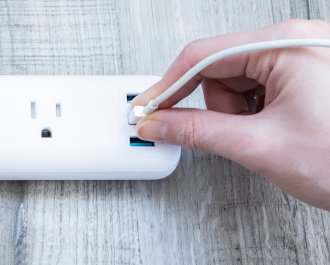
Picture this: your refrigerator is the steadfast keeper of your groceries, and your washing machine is your hardworking assistant. Both deserve protection from the unpredictable nature of power surges. These surges can come from various sources such as lightning strikes, overloaded circuits, or even the electrical grid adjusting. Let’s break down how you can protect your appliances from these pesky surges, ensuring they live a long, happy life.
Understanding Power Surges
To protect your appliances, it’s essential to first understand what power surges are. A power surge is a sudden spike in voltage that exceeds the normal flow of electricity. Think of it like a sudden tidal wave that crashes onto the beach, overwhelming everything in its path. Just like a tidal wave can cause destruction, a power surge can damage your appliances, leading to costly repairs or replacements.
Power surges can be caused by various factors. For instance, during a thunderstorm, lightning strikes can send a huge surge through the electrical system. Other common causes include faulty wiring, malfunctioning appliances, or even a sudden switch-on of high-energy devices like air conditioners. Knowing the culprits can help you stay one step ahead in protecting your valuable gadgets and appliances.
Invest in Surge Protectors
One of the most straightforward and effective ways to protect your appliances is to invest in surge protectors. These handy devices act as a shield, absorbing excess voltage and redirecting it to the ground. Think of it as a bouncer at a club, making sure only the right energy gets through to your appliances.
When choosing a surge protector, look for one with a high joule rating, as this indicates how much energy it can absorb before failing. An ideal surge protector for home use should have at least 1000 joules of protection. Keep in mind that not all surge protectors are created equal, so it’s wise to choose one from a reputable brand. You might also consider using whole-house surge protectors that can safeguard multiple devices at once—quite the multitasker!
Use Uninterruptible Power Supplies (UPS)
Another fantastic option to consider is using an Uninterruptible Power Supply (UPS). This device not only protects against power surges but also provides backup power in case of an outage. Imagine being able to finish that last load of laundry even when the power goes out—sounds pretty great, right?
A UPS lets you keep your appliances running for a limited time during an outage. It works by providing battery power instantly when it detects a problem with the main power supply. Just remember to choose one with enough capacity to support your devices. For instance, a UPS rated for 600-800VA can typically handle office equipment like computers or small home appliances.
Check Your Home’s Wiring
Sometimes, the best defense against power surges starts inside your home. Faulty or aging wiring can be a significant contributor to electrical problems, including surges. If your home is older, it might be time for a little electrical makeover.
Consider hiring an electrician to inspect your home’s wiring and electrical system. They can identify any issues such as frayed wires or loose connections. Keeping your wiring in top shape is like maintaining a well-oiled machine—it helps everything run smoothly and reduces the risk of unexpected surges.
Install Surge Protection at the Circuit Breaker
In addition to plug-in surge protectors, you can install surge protection directly at your circuit breaker. This method provides a robust line of defense for every outlet in your home. It’s like having a fortress that protects all your electronic devices at once.
Whole-house surge protectors are typically installed by an electrician and can guard against external surges while also protecting your home’s internal circuitry. These units can absorb the energy from a surge before it even reaches your appliances. While this may require a bit of an investment upfront, it could save you from more significant expenses down the line.
Be Mindful of Appliance Placement
Believe it or not, where you place your appliances can also make a difference in their resistance to power surges. Keeping sensitive electronics away from areas that are prone to electrical surges—like near the main electrical panel or heavy-duty machines—can be a simple yet effective strategy.
Also, consider unplugging appliances during thunderstorms or when they’re not in use for an extended period. This may seem a bit old school, but it’s a practical way to prevent damage from unexpected surges. Plus, it’s an excellent excuse to clean under your appliances now and then!
Regular Maintenance and Monitoring
Finally, like any good relationship, your appliances need regular attention. Establish a habit of checking the condition of your surge protectors and UPS systems every few months. If a surge protector has outlived its life span (usually indicated by a loss of indicator lights), replace it.
Keeping an eye on appliances for any signs of malfunction—like flickering lights or strange noises—can also alert you to potential hazards. If something seems off, it’s worth consulting a professional. After all, it’s better to be safe than sorry when it comes to protecting your investments.
In summary, protecting your appliances from power surges in zip code 46204 doesn’t have to be a daunting task. Arm yourself with knowledge and the right tools, and you’ll keep those unwelcome electrical storms at bay. By investing in surge protectors, considering UPS systems, maintaining your home’s wiring, and staying mindful of your appliances, you’ll ensure they remain safe and sound for years to come.